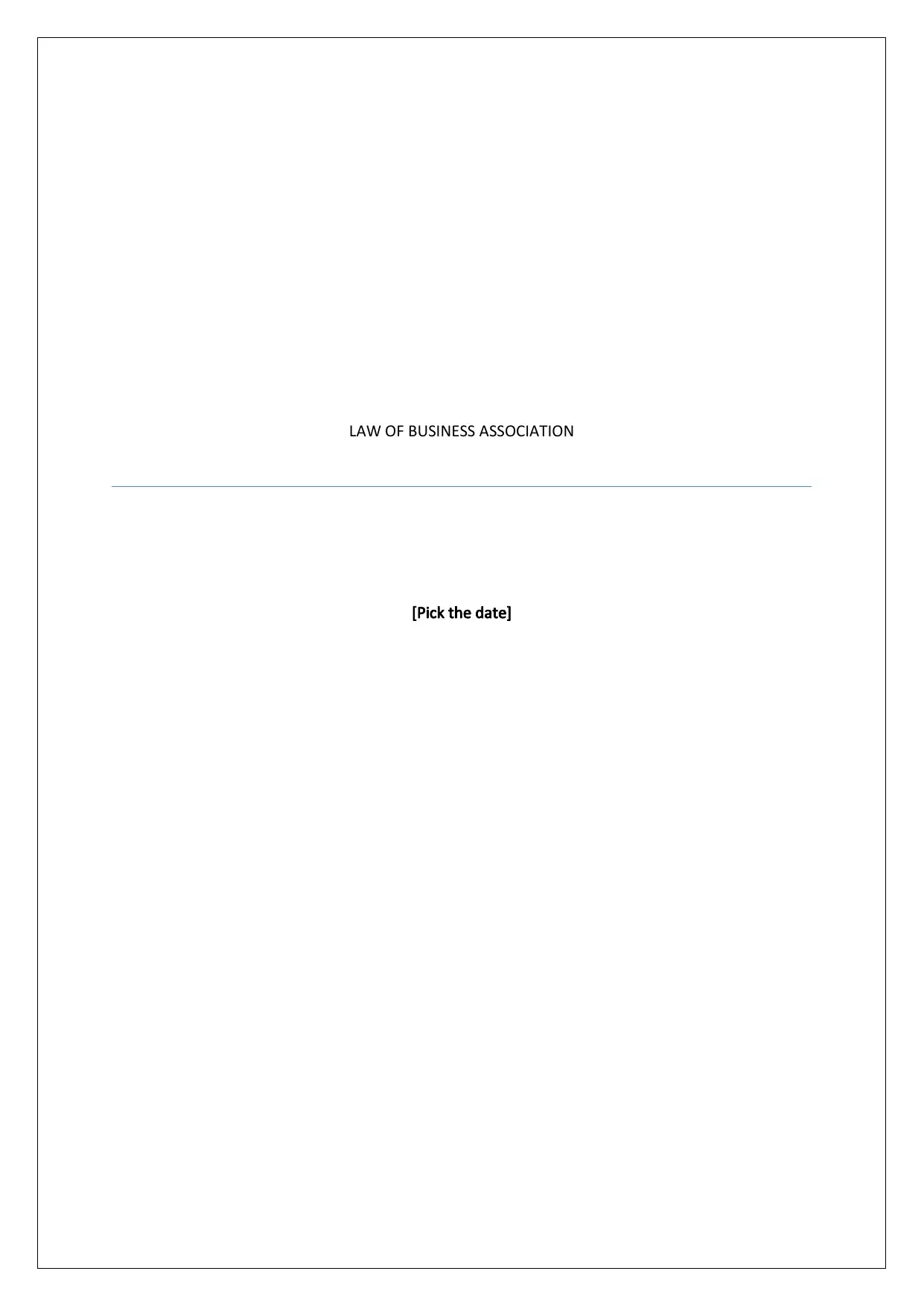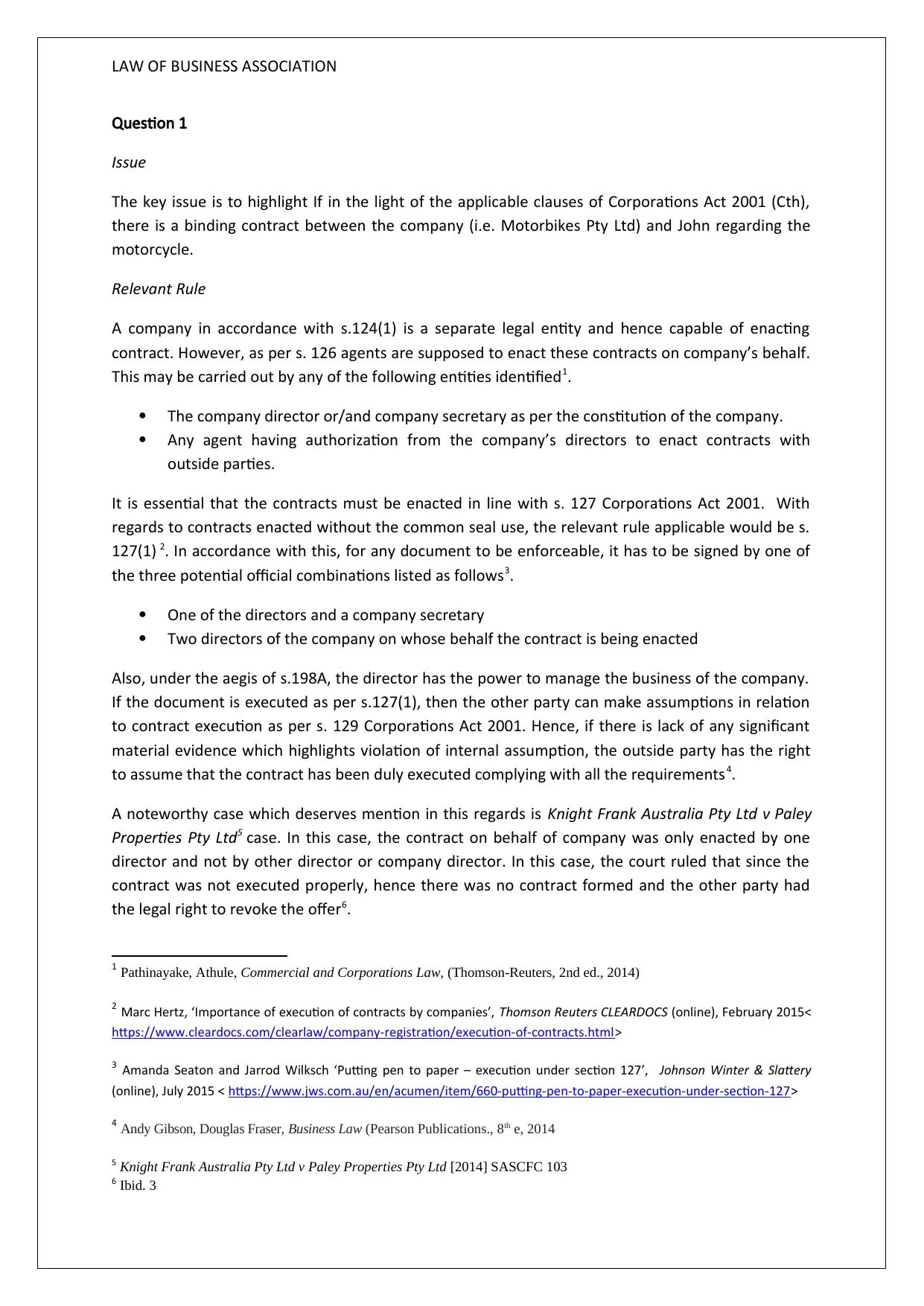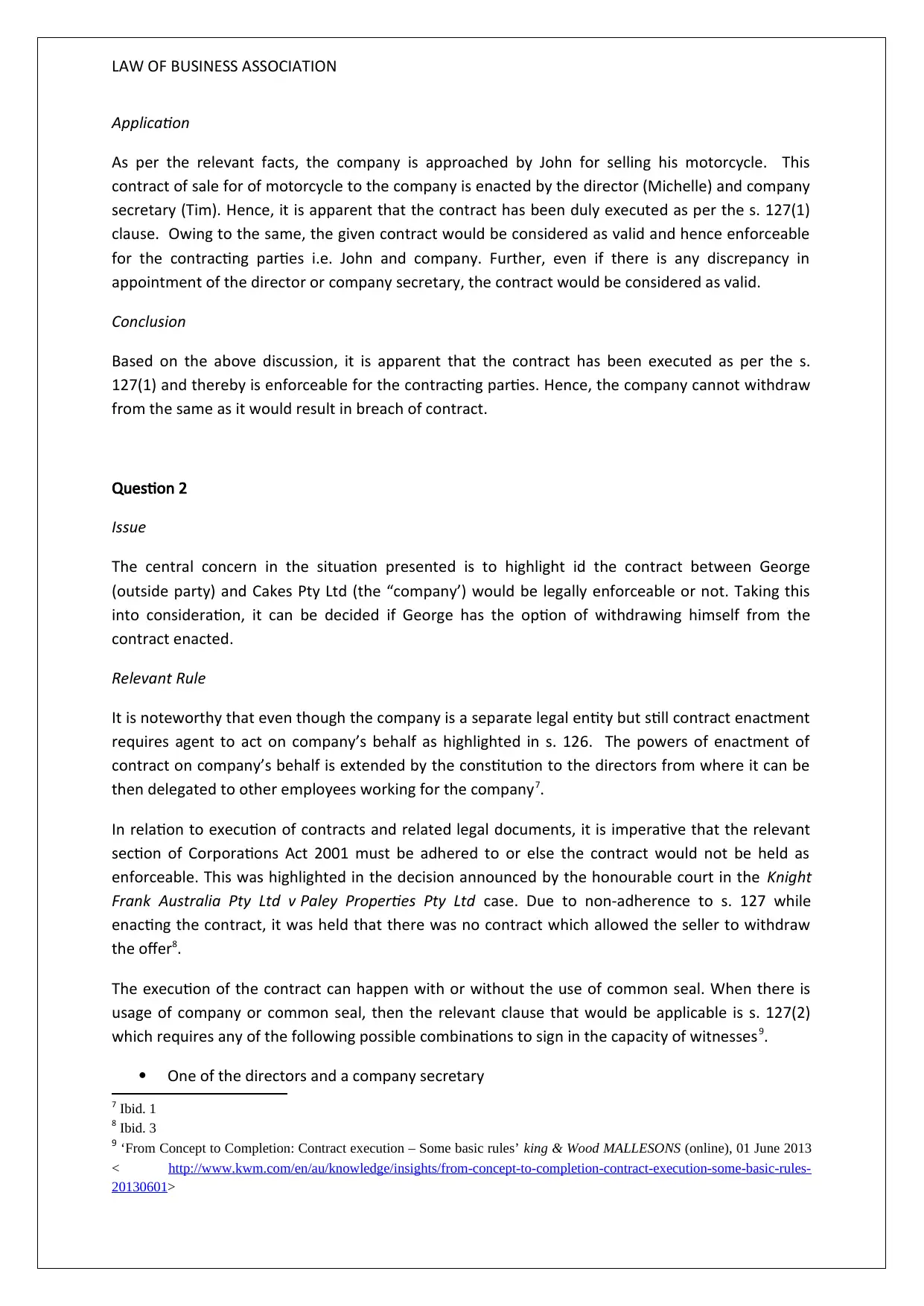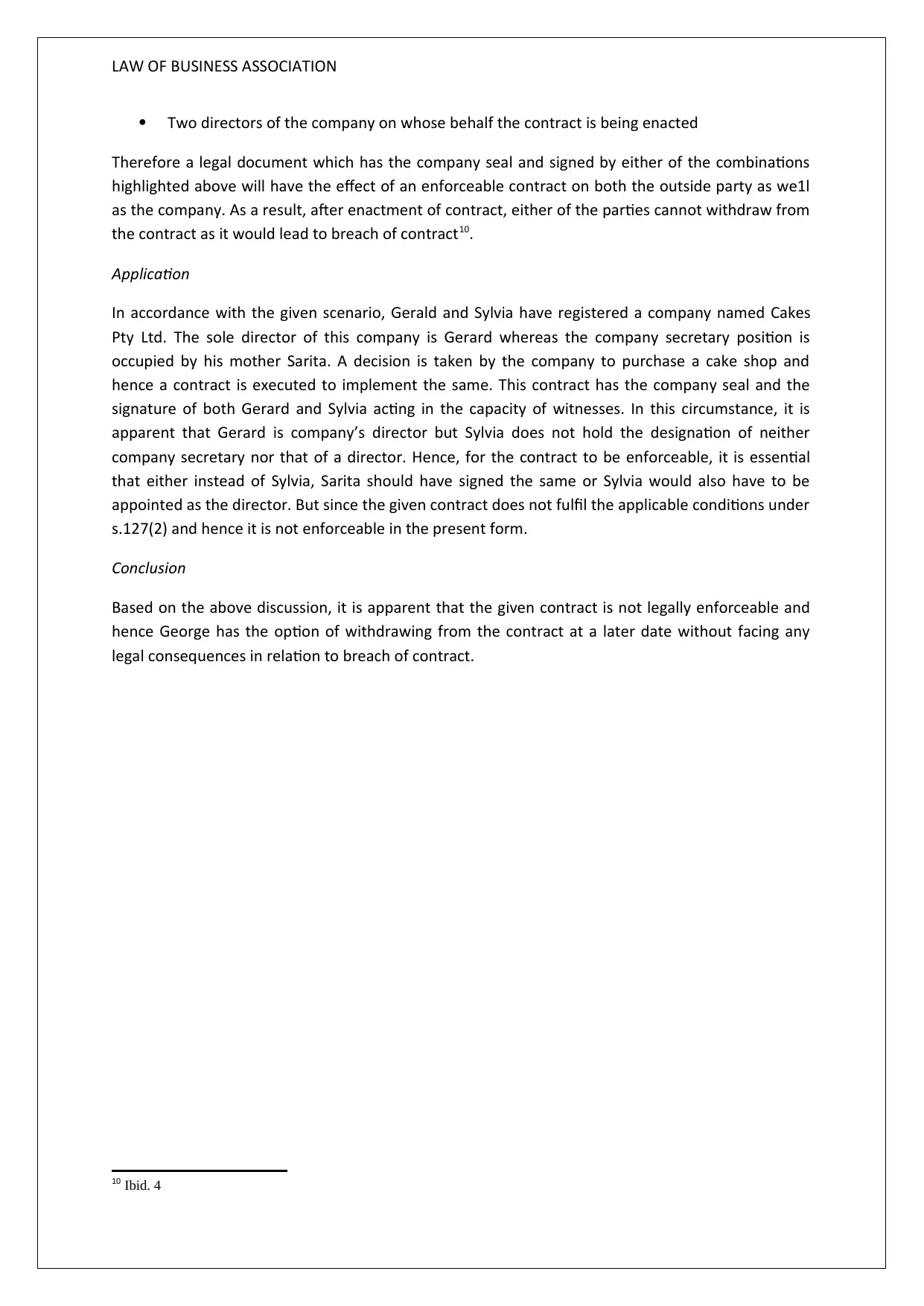Analysis of Contract Law: Business Association Scenario
VerifiedAdded on 2021/06/17
|4
|1162
|240
Homework Assignment
AI Summary
This document provides a detailed analysis of two legal scenarios related to business associations and contract law. The first scenario examines the validity of a contract between a company (Motorbikes Pty Ltd) and an individual (John) for the sale of a motorcycle, focusing on the application of sections 124, 126, 127, 129, and 198A of the Corporations Act 2001 (Cth) regarding contract execution by company directors and secretaries. The analysis considers the case of Knight Frank Australia Pty Ltd v Paley Properties Pty Ltd. The second scenario assesses the enforceability of a contract between George and Cakes Pty Ltd for purchasing a cake shop, focusing on the requirements of section 127(2) of the Corporations Act 2001 concerning the use of a company seal and proper signatures. The document concludes that the first contract is valid and enforceable, while the second is not, providing a comprehensive understanding of contract law principles in business settings.

LAW OF BUSINESS ASSOCIATION
[Pick the date]
[Pick the date]
Paraphrase This Document
Need a fresh take? Get an instant paraphrase of this document with our AI Paraphraser

LAW OF BUSINESS ASSOCIATION
Question 1
Issue
The key issue is to highlight If in the light of the applicable clauses of Corporations Act 2001 (Cth),
there is a binding contract between the company (i.e. Motorbikes Pty Ltd) and John regarding the
motorcycle.
Relevant Rule
A company in accordance with s.124(1) is a separate legal entity and hence capable of enacting
contract. However, as per s. 126 agents are supposed to enact these contracts on company’s behalf.
This may be carried out by any of the following entities identified1.
The company director or/and company secretary as per the constitution of the company.
Any agent having authorization from the company’s directors to enact contracts with
outside parties.
It is essential that the contracts must be enacted in line with s. 127 Corporations Act 2001. With
regards to contracts enacted without the common seal use, the relevant rule applicable would be s.
127(1) 2. In accordance with this, for any document to be enforceable, it has to be signed by one of
the three potential official combinations listed as follows3.
One of the directors and a company secretary
Two directors of the company on whose behalf the contract is being enacted
Also, under the aegis of s.198A, the director has the power to manage the business of the company.
If the document is executed as per s.127(1), then the other party can make assumptions in relation
to contract execution as per s. 129 Corporations Act 2001. Hence, if there is lack of any significant
material evidence which highlights violation of internal assumption, the outside party has the right
to assume that the contract has been duly executed complying with all the requirements4.
A noteworthy case which deserves mention in this regards is Knight Frank Australia Pty Ltd v Paley
Properties Pty Ltd5 case. In this case, the contract on behalf of company was only enacted by one
director and not by other director or company director. In this case, the court ruled that since the
contract was not executed properly, hence there was no contract formed and the other party had
the legal right to revoke the offer6.
1 Pathinayake, Athule, Commercial and Corporations Law, (Thomson-Reuters, 2nd ed., 2014)
2 Marc Hertz, ‘Importance of execution of contracts by companies’, Thomson Reuters CLEARDOCS (online), February 2015<
https://www.cleardocs.com/clearlaw/company-registration/execution-of-contracts.html>
3 Amanda Seaton and Jarrod Wilksch ‘Putting pen to paper – execution under section 127’, Johnson Winter & Slattery
(online), July 2015 < https://www.jws.com.au/en/acumen/item/660-putting-pen-to-paper-execution-under-section-127>
4 Andy Gibson, Douglas Fraser, Business Law (Pearson Publications., 8th e, 2014
5 Knight Frank Australia Pty Ltd v Paley Properties Pty Ltd [2014] SASCFC 103
6 Ibid. 3
Question 1
Issue
The key issue is to highlight If in the light of the applicable clauses of Corporations Act 2001 (Cth),
there is a binding contract between the company (i.e. Motorbikes Pty Ltd) and John regarding the
motorcycle.
Relevant Rule
A company in accordance with s.124(1) is a separate legal entity and hence capable of enacting
contract. However, as per s. 126 agents are supposed to enact these contracts on company’s behalf.
This may be carried out by any of the following entities identified1.
The company director or/and company secretary as per the constitution of the company.
Any agent having authorization from the company’s directors to enact contracts with
outside parties.
It is essential that the contracts must be enacted in line with s. 127 Corporations Act 2001. With
regards to contracts enacted without the common seal use, the relevant rule applicable would be s.
127(1) 2. In accordance with this, for any document to be enforceable, it has to be signed by one of
the three potential official combinations listed as follows3.
One of the directors and a company secretary
Two directors of the company on whose behalf the contract is being enacted
Also, under the aegis of s.198A, the director has the power to manage the business of the company.
If the document is executed as per s.127(1), then the other party can make assumptions in relation
to contract execution as per s. 129 Corporations Act 2001. Hence, if there is lack of any significant
material evidence which highlights violation of internal assumption, the outside party has the right
to assume that the contract has been duly executed complying with all the requirements4.
A noteworthy case which deserves mention in this regards is Knight Frank Australia Pty Ltd v Paley
Properties Pty Ltd5 case. In this case, the contract on behalf of company was only enacted by one
director and not by other director or company director. In this case, the court ruled that since the
contract was not executed properly, hence there was no contract formed and the other party had
the legal right to revoke the offer6.
1 Pathinayake, Athule, Commercial and Corporations Law, (Thomson-Reuters, 2nd ed., 2014)
2 Marc Hertz, ‘Importance of execution of contracts by companies’, Thomson Reuters CLEARDOCS (online), February 2015<
https://www.cleardocs.com/clearlaw/company-registration/execution-of-contracts.html>
3 Amanda Seaton and Jarrod Wilksch ‘Putting pen to paper – execution under section 127’, Johnson Winter & Slattery
(online), July 2015 < https://www.jws.com.au/en/acumen/item/660-putting-pen-to-paper-execution-under-section-127>
4 Andy Gibson, Douglas Fraser, Business Law (Pearson Publications., 8th e, 2014
5 Knight Frank Australia Pty Ltd v Paley Properties Pty Ltd [2014] SASCFC 103
6 Ibid. 3

LAW OF BUSINESS ASSOCIATION
Application
As per the relevant facts, the company is approached by John for selling his motorcycle. This
contract of sale for of motorcycle to the company is enacted by the director (Michelle) and company
secretary (Tim). Hence, it is apparent that the contract has been duly executed as per the s. 127(1)
clause. Owing to the same, the given contract would be considered as valid and hence enforceable
for the contracting parties i.e. John and company. Further, even if there is any discrepancy in
appointment of the director or company secretary, the contract would be considered as valid.
Conclusion
Based on the above discussion, it is apparent that the contract has been executed as per the s.
127(1) and thereby is enforceable for the contracting parties. Hence, the company cannot withdraw
from the same as it would result in breach of contract.
Question 2
Issue
The central concern in the situation presented is to highlight id the contract between George
(outside party) and Cakes Pty Ltd (the “company’) would be legally enforceable or not. Taking this
into consideration, it can be decided if George has the option of withdrawing himself from the
contract enacted.
Relevant Rule
It is noteworthy that even though the company is a separate legal entity but still contract enactment
requires agent to act on company’s behalf as highlighted in s. 126. The powers of enactment of
contract on company’s behalf is extended by the constitution to the directors from where it can be
then delegated to other employees working for the company7.
In relation to execution of contracts and related legal documents, it is imperative that the relevant
section of Corporations Act 2001 must be adhered to or else the contract would not be held as
enforceable. This was highlighted in the decision announced by the honourable court in the Knight
Frank Australia Pty Ltd v Paley Properties Pty Ltd case. Due to non-adherence to s. 127 while
enacting the contract, it was held that there was no contract which allowed the seller to withdraw
the offer8.
The execution of the contract can happen with or without the use of common seal. When there is
usage of company or common seal, then the relevant clause that would be applicable is s. 127(2)
which requires any of the following possible combinations to sign in the capacity of witnesses9.
One of the directors and a company secretary
7 Ibid. 1
8 Ibid. 3
9 ‘From Concept to Completion: Contract execution – Some basic rules’ king & Wood MALLESONS (online), 01 June 2013
< http://www.kwm.com/en/au/knowledge/insights/from-concept-to-completion-contract-execution-some-basic-rules-
20130601>
Application
As per the relevant facts, the company is approached by John for selling his motorcycle. This
contract of sale for of motorcycle to the company is enacted by the director (Michelle) and company
secretary (Tim). Hence, it is apparent that the contract has been duly executed as per the s. 127(1)
clause. Owing to the same, the given contract would be considered as valid and hence enforceable
for the contracting parties i.e. John and company. Further, even if there is any discrepancy in
appointment of the director or company secretary, the contract would be considered as valid.
Conclusion
Based on the above discussion, it is apparent that the contract has been executed as per the s.
127(1) and thereby is enforceable for the contracting parties. Hence, the company cannot withdraw
from the same as it would result in breach of contract.
Question 2
Issue
The central concern in the situation presented is to highlight id the contract between George
(outside party) and Cakes Pty Ltd (the “company’) would be legally enforceable or not. Taking this
into consideration, it can be decided if George has the option of withdrawing himself from the
contract enacted.
Relevant Rule
It is noteworthy that even though the company is a separate legal entity but still contract enactment
requires agent to act on company’s behalf as highlighted in s. 126. The powers of enactment of
contract on company’s behalf is extended by the constitution to the directors from where it can be
then delegated to other employees working for the company7.
In relation to execution of contracts and related legal documents, it is imperative that the relevant
section of Corporations Act 2001 must be adhered to or else the contract would not be held as
enforceable. This was highlighted in the decision announced by the honourable court in the Knight
Frank Australia Pty Ltd v Paley Properties Pty Ltd case. Due to non-adherence to s. 127 while
enacting the contract, it was held that there was no contract which allowed the seller to withdraw
the offer8.
The execution of the contract can happen with or without the use of common seal. When there is
usage of company or common seal, then the relevant clause that would be applicable is s. 127(2)
which requires any of the following possible combinations to sign in the capacity of witnesses9.
One of the directors and a company secretary
7 Ibid. 1
8 Ibid. 3
9 ‘From Concept to Completion: Contract execution – Some basic rules’ king & Wood MALLESONS (online), 01 June 2013
< http://www.kwm.com/en/au/knowledge/insights/from-concept-to-completion-contract-execution-some-basic-rules-
20130601>
⊘ This is a preview!⊘
Do you want full access?
Subscribe today to unlock all pages.

Trusted by 1+ million students worldwide

LAW OF BUSINESS ASSOCIATION
Two directors of the company on whose behalf the contract is being enacted
Therefore a legal document which has the company seal and signed by either of the combinations
highlighted above will have the effect of an enforceable contract on both the outside party as we1l
as the company. As a result, after enactment of contract, either of the parties cannot withdraw from
the contract as it would lead to breach of contract10.
Application
In accordance with the given scenario, Gerald and Sylvia have registered a company named Cakes
Pty Ltd. The sole director of this company is Gerard whereas the company secretary position is
occupied by his mother Sarita. A decision is taken by the company to purchase a cake shop and
hence a contract is executed to implement the same. This contract has the company seal and the
signature of both Gerard and Sylvia acting in the capacity of witnesses. In this circumstance, it is
apparent that Gerard is company’s director but Sylvia does not hold the designation of neither
company secretary nor that of a director. Hence, for the contract to be enforceable, it is essential
that either instead of Sylvia, Sarita should have signed the same or Sylvia would also have to be
appointed as the director. But since the given contract does not fulfil the applicable conditions under
s.127(2) and hence it is not enforceable in the present form.
Conclusion
Based on the above discussion, it is apparent that the given contract is not legally enforceable and
hence George has the option of withdrawing from the contract at a later date without facing any
legal consequences in relation to breach of contract.
10 Ibid. 4
Two directors of the company on whose behalf the contract is being enacted
Therefore a legal document which has the company seal and signed by either of the combinations
highlighted above will have the effect of an enforceable contract on both the outside party as we1l
as the company. As a result, after enactment of contract, either of the parties cannot withdraw from
the contract as it would lead to breach of contract10.
Application
In accordance with the given scenario, Gerald and Sylvia have registered a company named Cakes
Pty Ltd. The sole director of this company is Gerard whereas the company secretary position is
occupied by his mother Sarita. A decision is taken by the company to purchase a cake shop and
hence a contract is executed to implement the same. This contract has the company seal and the
signature of both Gerard and Sylvia acting in the capacity of witnesses. In this circumstance, it is
apparent that Gerard is company’s director but Sylvia does not hold the designation of neither
company secretary nor that of a director. Hence, for the contract to be enforceable, it is essential
that either instead of Sylvia, Sarita should have signed the same or Sylvia would also have to be
appointed as the director. But since the given contract does not fulfil the applicable conditions under
s.127(2) and hence it is not enforceable in the present form.
Conclusion
Based on the above discussion, it is apparent that the given contract is not legally enforceable and
hence George has the option of withdrawing from the contract at a later date without facing any
legal consequences in relation to breach of contract.
10 Ibid. 4
1 out of 4
Related Documents
Your All-in-One AI-Powered Toolkit for Academic Success.
+13062052269
info@desklib.com
Available 24*7 on WhatsApp / Email
![[object Object]](/_next/static/media/star-bottom.7253800d.svg)
Unlock your academic potential
Copyright © 2020–2026 A2Z Services. All Rights Reserved. Developed and managed by ZUCOL.





